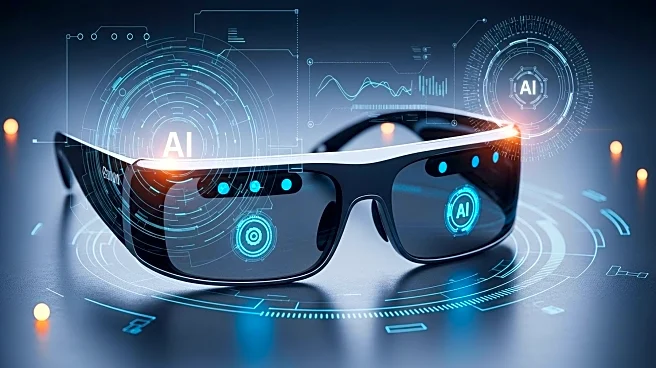What's Happening?
OpenAI is reportedly exploring the development of ChatGPT-enabled smart glasses, despite previous public statements by CEO Sam Altman expressing disinterest in the form factor. This consideration comes as part of OpenAI's broader hardware ambitions, following its acquisition of Jony Ive's hardware startup io and a partnership with his design studio LoveFrom. The company is actively recruiting design, manufacturing, and supply chain talent from Apple to support its hardware initiatives. While OpenAI's first devices, including a smart speaker and a pocket-sized device, are anticipated to launch between 2026 and 2027, the potential introduction of smart glasses remains speculative and would likely occur much later. This move positions OpenAI in competition with tech giants like Meta, Google, and Apple, who are already advancing in the smart glasses market.
Why It's Important?
The potential entry of OpenAI into the smart glasses market could significantly impact the competitive landscape of wearable technology. As AI becomes increasingly integrated into consumer devices, OpenAI's involvement could drive innovation and influence market dynamics. However, the delay in launching such products may place OpenAI at a disadvantage compared to established players like Meta, Google, and Apple, who are already investing heavily in this technology. The development of AI-driven smart glasses could enhance user experiences by providing contextual AI assistance, potentially transforming how individuals interact with technology in daily life. This shift could also spur advancements in AI applications, further embedding AI into consumer electronics and everyday activities.
What's Next?
If OpenAI proceeds with developing smart glasses, the company will need to navigate several challenges, including design, manufacturing, and market positioning. The recruitment of former Apple staff suggests a focus on high-quality design and production standards. OpenAI's strategic decisions in this area will likely influence its competitive standing in the tech industry. Additionally, the company's ability to differentiate its products from those of established competitors will be crucial. As the market for AI-integrated wearables grows, consumer adoption and feedback will play a significant role in shaping future developments and OpenAI's approach to hardware innovation.
Beyond the Headlines
The exploration of smart glasses by OpenAI raises questions about privacy and data security, as these devices could potentially collect and process vast amounts of personal information. Ethical considerations regarding the use of AI in everyday life will need to be addressed, particularly in terms of user consent and data protection. Furthermore, the integration of AI into wearable technology could lead to broader societal changes, influencing how individuals interact with their environment and each other. The long-term implications of such advancements may include shifts in social norms and expectations around technology use.









